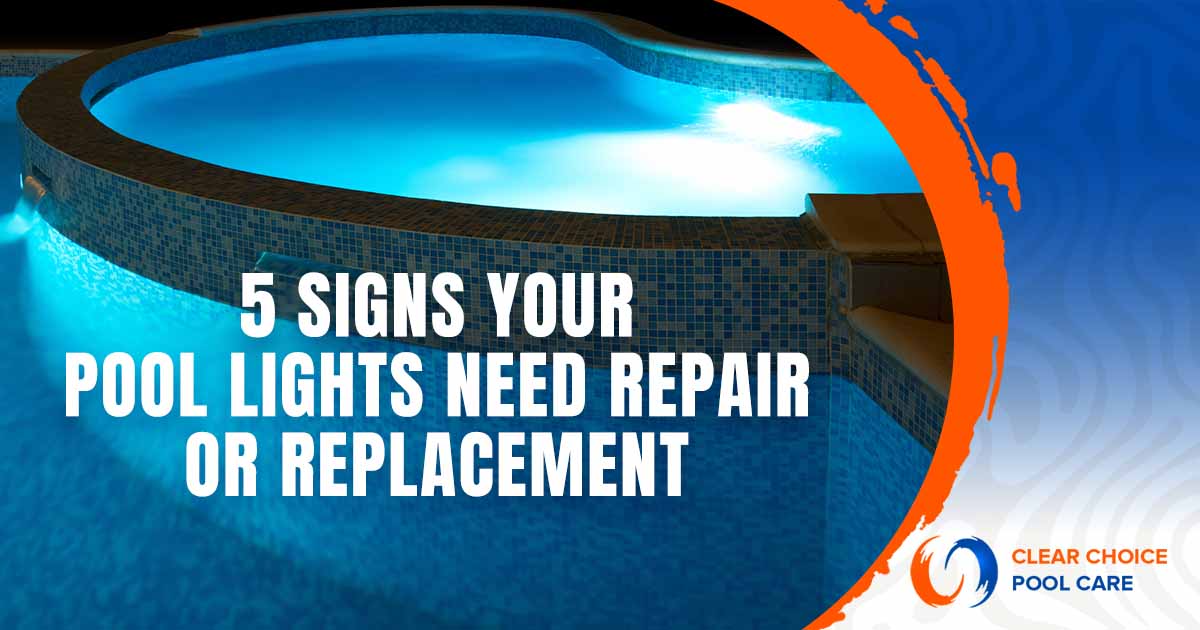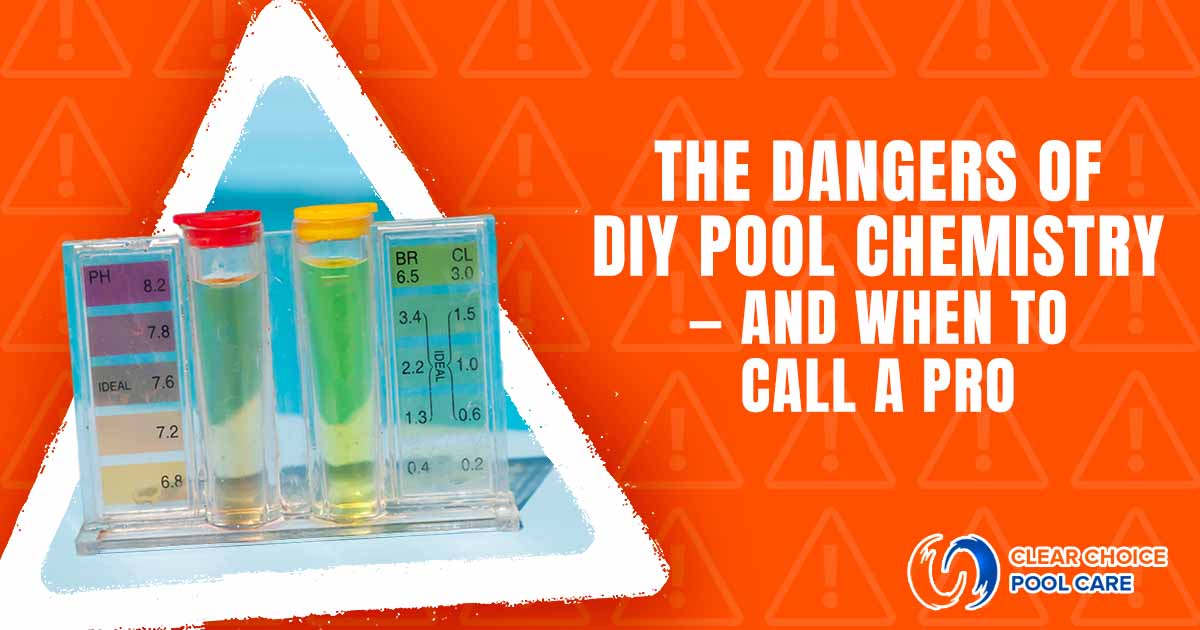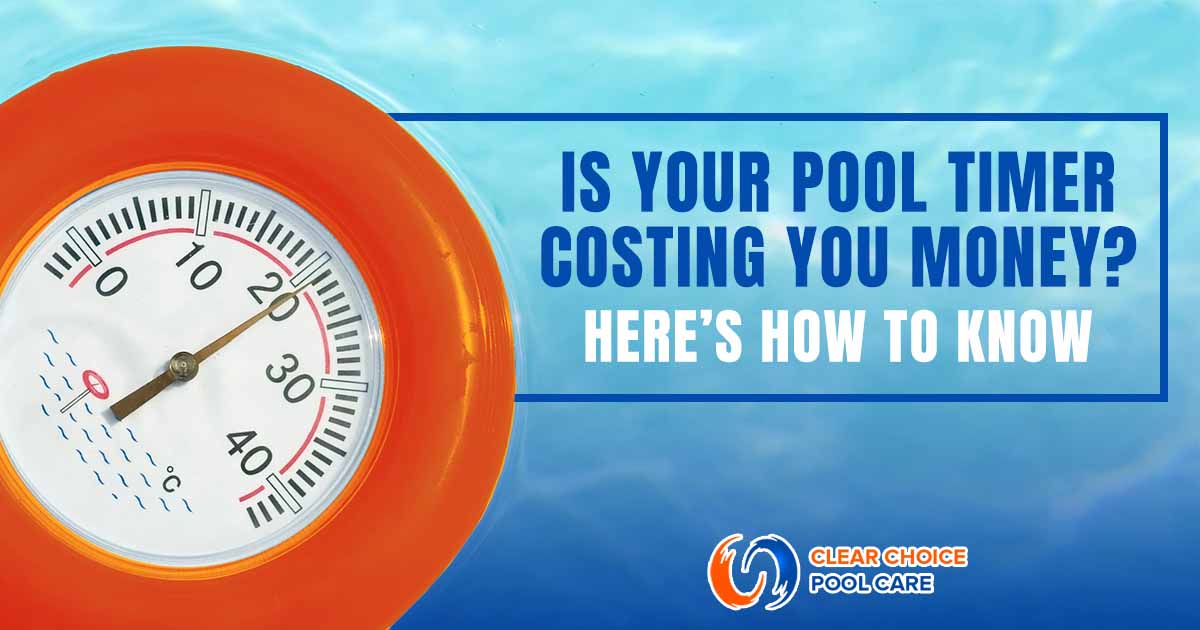A well-lit pool enhances safety and visibility while improving the overall look of an outdoor space. However, broken pool lights can pose electrical hazards and reduce nighttime visibility. Recognizing the early signs of pool light failure helps prevent costly repairs and ensures the system operates efficiently.
Ignoring damaged or malfunctioning pool lights can lead to more significant issues, including electrical risks and fixture damage. This guide outlines five common signs that indicate the need for pool light repair or replacement.
1. Flickering or Dimming Broken Pool Lights
Causes of Flickering Pool Lights
Pool lights that flicker on and off may indicate electrical issues. Loose wiring, corroded connections, or a failing transformer can disrupt power flow, causing inconsistent lighting. Additionally, worn-out bulbs nearing the end of their lifespan may flicker before completely burning out.
Why Dim Pool Lights Indicate a Problem
Dim lighting is often a sign of voltage issues. A faulty transformer may not supply the correct voltage, leading to insufficient brightness. Over time, debris and mineral buildup on the lens can also reduce light output. If cleaning the fixture does not improve brightness, professional repair may be necessary.
Ignoring flickering or dim pool lights can result in complete failure or potential electrical hazards. A licensed pool technician can diagnose the issue and determine whether repair or replacement is required.
2. Pool Lights Won’t Turn On at All
Possible Electrical Issues Behind Broken Pool Lights
When pool lights fail to turn on, the issue is often electrical. A tripped circuit breaker or blown fuse may prevent power from reaching the fixture. Ground Fault Circuit Interrupter (GFCI) outlets, which are designed to protect against electrical hazards, may also shut off power to the lights if a fault is detected. Resetting the breaker or GFCI can sometimes resolve the problem.
If the light does not work after resetting the power, the issue could be a failed transformer, faulty switch, or damaged wiring. To avoid safety risks, a professional should always handle electrical problems.
When to Call a Professional for Pool Light Repair
If troubleshooting does not restore power to the lights, it is best to contact a pool lighting specialist. Pool light fixtures are submerged in water, and any wiring issues pose a risk of electric shock. A technician can safely inspect the system, identify the cause, and recommend the appropriate repair or replacement.
3. Water Inside the Pool Light Fixture
How Water Leaks Cause Broken Pool Lights
Pool lights are designed to be waterproof, but over time, seals and gaskets can deteriorate, allowing water to enter the fixture. Cracks in the light housing can also lead to leaks, creating a dangerous situation where electricity and water mix.
Risks of Ignoring Water-Damaged Pool Lights
Water intrusion can cause the light to short-circuit, leading to flickering, dimming, or complete failure. More importantly, moisture inside the fixture increases the risk of electrical shock. If water is visible inside the light housing, the power should be turned off immediately, and a professional should be contacted to assess the damage.
4. Discolored or Burnt-Out Pool Light Bulbs
Common Causes of Discoloration in Pool Lights
A yellowed or cloudy pool light lens can reduce visibility and indicate a problem. Heat buildup from improper bulb wattage can cause discoloration, while imbalanced pool chemicals can damage the light cover over time.
When to Replace vs. Repair Burnt-Out Pool Lights
If a pool light bulb burns out, replacing it may be a simple fix. However, a complete replacement may be necessary if the fixture shows signs of corrosion, water damage, or electrical failure. A professional can assess whether a repair or a full fixture replacement is the best option.
5. Outdated or Inefficient Pool Lighting
Signs Your Pool Lighting Needs an Upgrade
Older pool lighting systems, especially incandescent bulbs, consume more energy and provide less illumination than modern LED options. If pool lights appear dim even after replacing the bulb, it may be time to upgrade to a more efficient lighting system.
Benefits of LED Pool Light Replacement
LED pool lights offer several advantages, including:
- Lower energy consumption
- Longer lifespan compared to traditional bulbs
- Brighter and more even illumination
- Customizable color options for enhanced aesthetics
Ensure Safety & Efficiency with Professional Pool Light Repair
Upgrading to LED pool lights improves energy efficiency while reducing maintenance needs. A professional can assess the existing system and recommend the best lighting solution for long-term performance.
Call Clear Choice Pool Care for Expert Pool Light Repair
Broken pool lights should never be ignored, as they pose safety risks and reduce a swimming pool’s functionality. Professional repair or replacement is the best solution for flickering lights, electrical issues, or outdated fixtures.
Contact Clear Choice Pool Care at 469-451-0222 for reliable pool light repair today. Their experienced technicians provide expert service to restore safe and efficient lighting for any pool.





